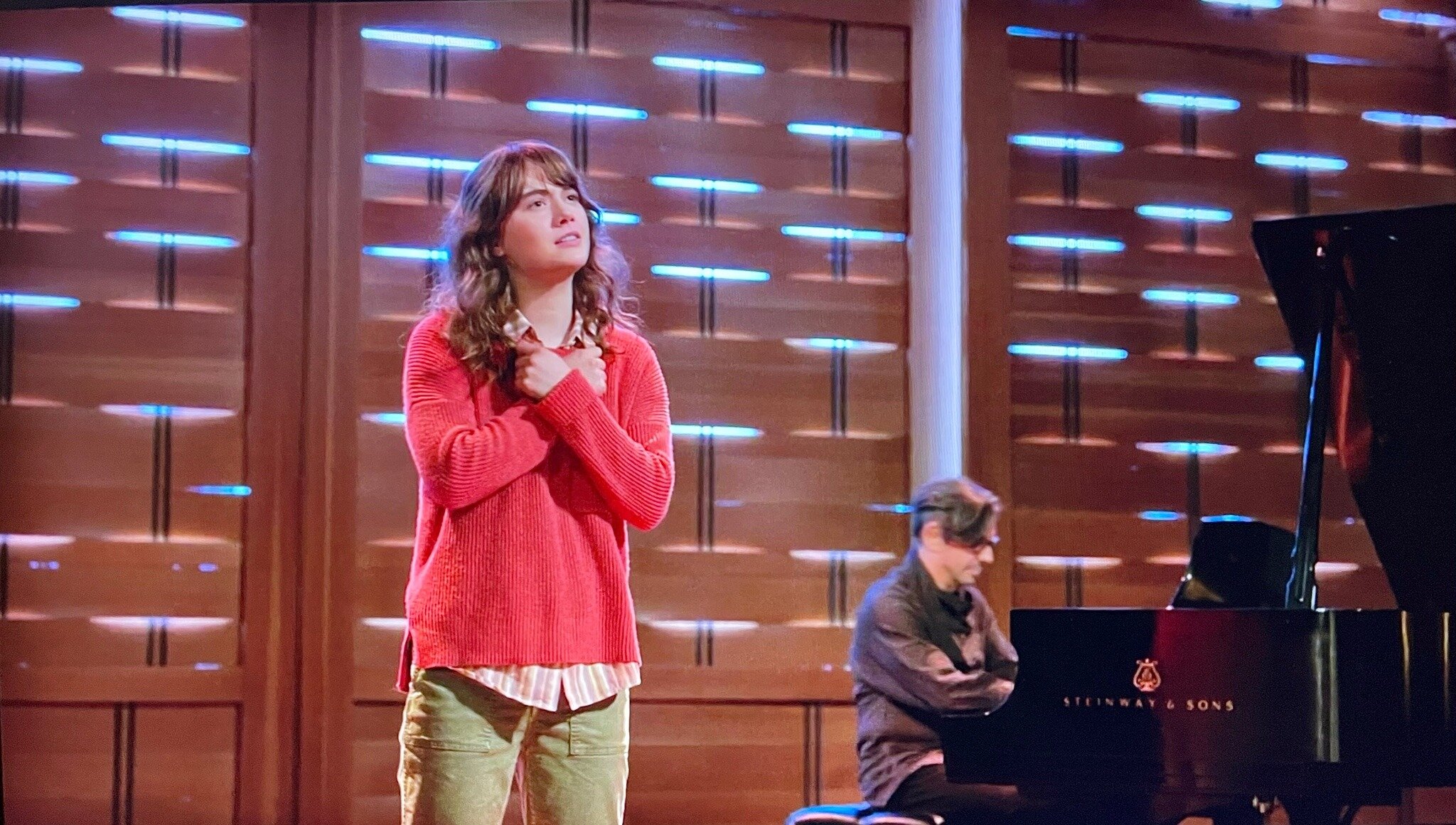Written and directed by: Sian Heder
Starring: Emilia Jones, Marlee Matlin, Troy Kotsur, Daniel Durant, Eugenio Derbez, and Amy Forsyth
Runtime: 111 minutes
Bring tissues. You may sail away on an ocean of tears.
Ruby Rossi (Emilia Jones) loves her family. She also works on their fishing boat practically every day. For anyone who labored with their mom, dad, brothers, or sisters in a family-owned business, you know that you’re locked into a 24/7 commitment.
Okay, Ruby doesn’t immerse herself in everything-fish for every waking or sleeping moment. Still, she regularly sets her alarm for 3 a.m. to accompany her dad, Frank (Troy Kotsur), and her older brother, Leo (Daniel Durant), on their vessel, The Angela Rose. The three sail the Massachusetts coast, searching for the freshest of seafood, and the kids don’t fight the Rossi System because helping their dad is just what they do. Their mom, Jackie (Marlee Matlin), does her part by maintaining their home.
Our worker bee also is a high school senior, but college isn’t a thought. Ruby maintains a full-class schedule at Gloucester High School, so life has loaded this 17-year-old with piles of assignments.
She also has one additional commitment.
Frank, Jackie, and Leo are deaf, so Ruby is a critical human rudder as a hearing deckhand on their boat. She is present to answer radio calls from, say, the U.S. Coast Guard, and she also frequently interprets for her mom, dad, and brother with other fishermen and fisherwomen – and others in their town – day-to-day, month-to-month, and year-to-year. The Rossis live catch-to-catch (rather than paycheck-to-paycheck), so Frank can’t hire someone else. Ruby is it.
However, she smacks into a sudden riptide that emotionally yanks her in another direction. Ruby joins the school choir because Miles (Ferdia Walsh-Peelo) - a boy she likes - signs up first. However, she discovers her passion for singing, a pursuit that runs thick with irony.
“CODA” isn’t an ironic coming-of-age story. It’s a straight-up one, albeit with a twist. Ruby is a Child of Deaf Adults (CODA). Although this dynamic isn’t a unique cinematic story. Writer/director Sian Heder’s film is a remake of “La Famille Belier” (2014), nominated for six Cesar Awards. Louane Emera – who played Paula Belier, Ruby’s 2014 counterpart in the French picture – won the 2015 Most Promising Actress Cesar, and after watching Jones’ performance, she has a bright future as well.
During a Jan. 28, 2021 Deadline Hollywood interview, we discover that Jones (19 years young) never had a singing lesson before being cast, and she learned sign language for the role. You could’ve fooled this critic because Jones effortlessly carries both skills on-screen like she’s been signing and professionally singing for almost two decades. Emilia has a beautiful voice, one that will stop you in your tracks and bring tears to your eye for good measure.
Heder’s movie is a lovely, heartwarming affair that tugs on our emotions in the most critical moments. However, to get there, she tows us through Ruby’s trying scheduling dilemma, which – admittedly – can be laborious. The movie’s runtime is 111 minutes, but looking back, you’d swear “CODA” is well over two hours. Not only does Heder frequently volley between our young protagonist’s two worlds, but the writer/director also regularly features Ruby’s mischievous friend, Gertie (Amy Forsyth), and Miles. We hope that our lead and Miles capture some teenage romance, and Walsh-Peelo is a familiar face because he made a splash in “Sing Street” (2016) as a lovestruck teenager who formed a band to impress an older girl. The roles are reversed here, and Ruby is a flat-out superstar who doesn’t realize it.
(Note: Jones and Walsh-Peelo are English and Irish natives, respectively, and they offer splendid American accents. You’d never know that they are from across the pond, but as a minor criticism, neither one sports a hint of a Massachusetts accent. (i.e. park the car = pahk the cah). Well, their General American English enunciation is more pleasing anyway, so let’s roll with it.)
Indeed, the script rolls through several moving parts. To complicate matters, the Rossis attempt to form a collation with other locals to sell their own fish rather than continually watch intermediaries deeply cut into their profits.
That’s no easy task, but it’s not particularly engaging for the audience to sit through either. Now, I’ve seen the movie three times, and during the first screening, following the family’s new business pursuits felt like a humdrum slog. However, after subsequent viewings, I realized that this procedural plot point is pretty darn vital to the story. Heder needs an anchor to keep Ruby more involved with the fishing business, and revamping their distribution model is a fine script idea. The added gravitational pull effectively drags Ruby farther away from choir, and we feel her angst and conflict along the way.
Ruby’s home life – like just about every teenager - isn’t anxiety-free, and in her case, the family’s trade is everything. Her folks aren’t dolling out chores but responsibilities. Therefore, Heder reinforces this reality by regularly pitting Ruby into a constant stream of minor battles. Granted, she doesn’t live in an abusive home. Not in the least, but she faces a daily grind of arguments.
What is her reprieve? Singing.
Her harmonious gift catches the high school’s choir director’s attention. Bernardo Villalobos (Eugenio Derbez) believes Ruby could earn a scholarship to his alma mater, the Berklee College of Music in nearby Boston.
Derbez is a rock star as Ruby’s teacher, as Mr. V. balances pure enthusiasm for his choral craft with hilarious sarcasm and intolerance for failing to meet him halfway, even for the smallest of points.
For instance, Bernardo wishes to speak with Ruby and Miles after class. The kids slowly stroll back to their teacher, and he casually responds, “Today, if it’s possible.”
Later, Mr. V. discovers that these two didn’t practice their duet together. He frustratingly points out, “Duet. It’s in the word. You must ‘do it’ together.”
Derbez, a massive television star in Mexico and a graduate of the Mexican Institute of Cinematography and Theatre, lands and delivers his best U.S.-based acting role to date, one that allows him the freedom to explore his comic talents as well as his musical ones. Truly, Derbez’s Mr. V. is one of the great big-screen educators in recent memory, and you’ll find yourself cheering on Ruby’s incremental progress during every precious lesson.
Time, however, is a precious commodity, and Ruby finds herself unable to fit two immovable objects – after-school lessons with Mr. V. and her fishing obligations – into her schedule.
Her relatives’ reactions to choir range from indifferent to discouraging, and Jackie takes the most pessimistic view. She doesn’t see the point and feels that her daughter is just a teenager with her priorities out of whack. Perhaps Ruby is expressing a rebellious streak.
Jackie says, “If I was blind, would you want to paint?”
That hurts.
Jackie doesn’t get it, but then again, she has a different viewpoint, especially since Ruby accuses her of not socializing with the other fishermen and fisherwomen, their spouses, and kids. Ruby mentions that her mom only catches up with her deaf friends once a month, so yes, Jackie’s time revolves around her household, and she closes herself off from nearly everything else. To be fair, it’s more of an assumption but a fair one. Matlin plays Jackie with her character’s flaws on display, but to her, financial solvency takes priority over a teenager’s whim.
A pragmatic approach, for sure, because who wants bankruptcy? Still, this movie is about Ruby’s journey, so Jackie’s objections become a serious hurdle.
Leo and Ruby crash into hurdles rather than step over or around them. These siblings bicker more fervently (and more vulgarly) than British Parliament’s Question Time during a three-day hunger strike and immediately after an England World Cup loss. How’s that for argumentative? Leo resents Ruby because their folks lean on her - through her hearing – and he feels emasculated or reduced in stature. He wants to make big decisions for their business but believes that Ruby constantly undercuts him. If there’s an heir to the throne, Ruby will wear the crown, a title that she doesn’t want. Durant’s Leo is a bit brazen with a chip the size of Fenway Park on his shoulder, and he adds a contentious dimension to Ruby’s stress. Then again, their relationship also plays like fun sibling rivalry, although they frequently use vocabulary that one cannot repeat on terrestrial radio. Think of the seven infamous words and multiple them by 100.
Ruby communicates more than seven words to her dad. They sign frequently, but she has the most emotionally distant relationship with him (within their home).
Frank doesn’t have a hipster beard but a long, straggly one. Kotsur – regal and charming in person (as I’ve met and interviewed him) – is considerably unkempt as Frank, a man weathered and pained over the years through economic strife and hard labor. He probably never gives his physical appearance and clothing choices second thoughts, and perhaps, they are reflections of his internal churn.
Back to the point at hand, Frank’s overwhelming concern is keeping a roof over their heads, so his daughter’s choir fascination is just a distraction. Still, he doesn’t encourage or discourage her. He’s Switzerland. He doesn’t interfere. As long as the fishing continues unabated, Frank and Ruby are at peace but still detached. So, Heder offers plenty of room for their father-daughter rapport to grow, which is all by design.
Days and nights at the Rossi residence would feel mainly routine (because we’re experiencing Ruby’s life-voyage through her eyes) except for two key elements. First, Heder sometimes includes frank, sexual humor that flies out of seemingly nowhere. These unexpected moments tonally don’t fit into the movie, but no question, there are some genuine belly laughs here, and Kotsur and Forsyth are especially funny.
Second, everyday parenting and consternation over cash flow problems rise above the mundane for moviegoers because the Rossis communicate through sign language. No question, watching Frank, Jackie, Leo, and Ruby interact is a rare encounter at the movies. The four characters’ everyday discourse - even with the smallest of details, like Jackie telling Ruby to stop slouching - adds layers of nuance and newness to the cinematic experience, certainly for hearing communities. They are refreshing ones for deaf audiences.
There are bonds between the hearing and deaf, both behind the scenes and on-screen. In addition to Jones, Heder learned to sign for this film, and the director also includes a striking scene in which hearing viewers experience music through a deaf perspective. Even though the moment lasts for perhaps 10 or 20 seconds, it will remain with you for weeks and weeks after the end credits roll.
With its rare big-screen focus, unexpected humor, beautiful song choices (which will not be revealed in this review), and some downright touching moments, “CODA” resonates, but it all comes together through this acting ensemble and their obvious chemistry. Just as Ruby seems like she’s been signing and professionally singing for nearly twenty years, Frank, Jackie, Leo, and Ruby feel like a genuine family, and Mr. V. is her second one too.
Ruby connects with both clans. Will her worlds no longer collide but unite? Well, you have to watch “CODA” to find out, but bring tissues. You’ll need them because you might sail away on an ocean of tears.
Jeff’s ranking
3/4 stars














